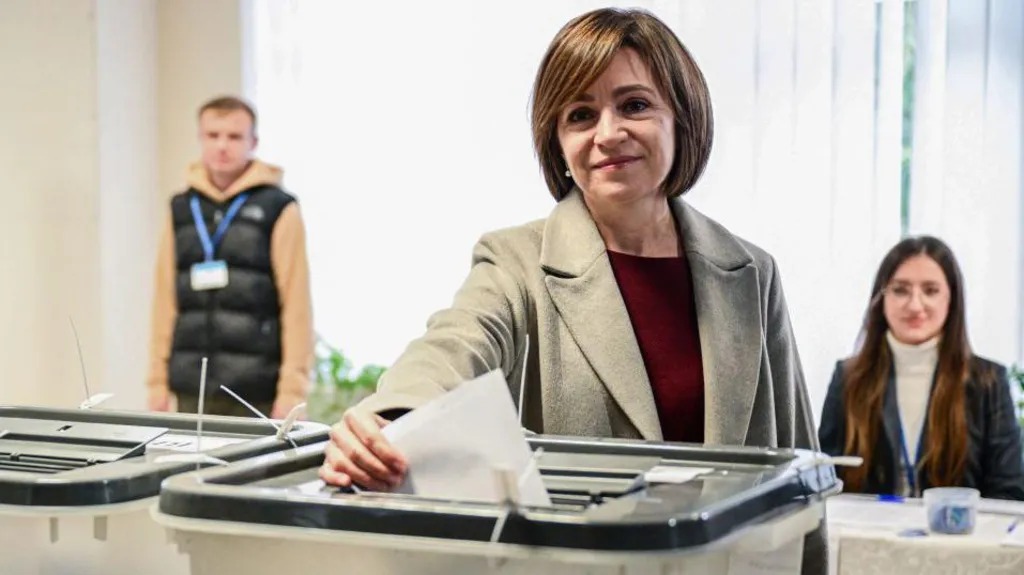
Moldova Election: Pro-EU Sandu vs. Pro-Russian Stoianoglo
The Moldova election pro-EU vs. pro-Russian candidates Maia Sandu and Alexandr Stoianoglo has reached its second round, as voters head to the polls to determine Moldova’s future direction. This election is a crucial decision between closer European integration or returning to Russian influence, with Russian interference allegations casting a shadow over the vote.
A Critical Choice Between Europe and Russia
Moldova’s pro-European leader, Maia Sandu, is vying to retain her position against Stoianoglo, who has the support of the pro-Russian Party of Socialists. Sandu, the current president, warns that powerful interests, including a fugitive oligarch based in Russia, are working to sway the election for Moscow’s benefit. Meanwhile, the Kremlin denies meddling, as they did in Georgia’s recent contested elections, claiming, “We are not doing this,” according to spokesman Dmitry Peskov.
Election Stakes: Moldova’s Path Towards the EU
Maia Sandu won the first round with 42.4%, short of the majority needed to avoid a run-off. Alexandr Stoianoglo, who received 26%, is likely to gain additional support in this round from other pro-Russian candidates. Sandu has led Moldova in opening talks for EU membership, with recent constitutional changes backing this goal. Former Defense Minister Anatol Salaru describes the Moldova election pro-EU vs. pro-Russian debate as pivotal, with Moldova choosing either European integration or alignment with Russia.
For more on global elections, check BBC’s coverage.
Russian Influence and Allegations of Vote Buying
The Moldovan authorities have flagged concerning financial activity linked to fugitive oligarch Ilan Shor, who allegedly transferred millions of dollars from Russia to influence the election. Shor, facing charges of money laundering, denies wrongdoing, though he promised cash handouts for those supporting a “firm No” to the EU. While Stoianoglo denies any association with Shor, he benefits from the support of the pro-Russian opposition, led by former president Igor Dodon.
Polling and the Influence of Transnistria
Nearly 2,000 polling stations are open across Moldova, including 30 designated for voters from the breakaway, Russian-speaking Transnistria region. This region, bordering Ukraine, hosts a Russian military base, adding tension to Moldova’s geopolitical positioning. Moldovan authorities remain vigilant about any attempts to sway votes from this area, especially given previous Russian troop presence and influence near the Black Sea.
Impact of Expatriates on the Election
The Moldovan diaspora, which includes 1.2 million Moldovans abroad, represents a significant voting bloc, with many supporting Sandu’s EU-friendly stance. Expatriate votes could prove critical for Sandu, tipping the balance in her favor as they overwhelmingly backed her in previous elections. Moldova’s large expat population may have the final say in this close race between pro-EU and pro-Russian candidates.
The Populist Influence and Uncertain Outcomes
Renato Usatii, a populist ex-mayor who came in third in the first round, has refused to endorse either candidate, stating that Moldovans should decide independently. His neutrality adds unpredictability to the election, further intensifying the Moldova election pro-EU vs. pro-Russian divide. Analysts note that the race remains wide open, with Moldova’s future influence on the Danube and Black Sea regions hanging in the balance.
Moldova’s Future on the Line
As Moldovans head to the polls, this election will decide whether the country continues pursuing European integration under Sandu or adopts a more balanced foreign policy with Russia under Stoianoglo. Amid allegations of Russian influence and vote-buying scandals, the Moldova election pro-EU vs. pro-Russian decision is one of Moldova’s most crucial political crossroads.





